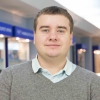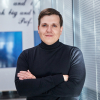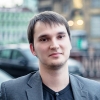
Vladimir Vinogradov, head of the International Laboratory "Solution Chemistry of Advanced Materials and Technologies."
I joined the academic community by chance. Writing a thesis was not my main goal, I just wanted to create innovations, introduce them into the market and do business. Once, it occurred me that modern science is a kind of business with its specific rules, which is less cruel and which gives vast opportunities. That is how I became a scientist.
I am so excited by transformations of the world. And it is not only about politics. Today, technologies change the present completely. It is wonderful to be a part of this process.
Teaching youth inspires me to contribute to the science. I don’t use the word "students" because they are our partners. Generally, I want young scientists to win Nobel Prizes, stay in Russia and respect science.

Anton Pyrkin, head of the Faculty of Control Systems and Industrial Robotics
I have been interested in math since childhood. I solved plenty of math problems together with my parents. My grandmother worked as a math teacher. It was a kind of my hobby to solve puzzles at weekends together with her. Thanks to school math Olympiads these activities became regular. Then, thanks to my research supervisor at the university, science became my profession. He showed me some promising research areas that attract the world’s academic community. Fortunately, my present job is what I really like.
It is perfect when your occupation is based on three main things like having fun, a high salary and freedom. When you don’t get even one of them you will definitely have problems. It means that you have to find reasons why you are doing this job. My field gives me these three things, so I am almost never tired of this.

Daniil Voloshin, engineer at the eScience Research Institute
It is a fascinating story; when I was a child I saw a crowd and told myself: "I have to understand how it works."
The more researchers I met at university, the more enthusiasm for studying I got. I wanted to understand what made people so inspired by the problems they research. Once I found myself sharing my research interests with others, then I noticed that I have more and more soulmates. And I unexpectedly understood that I don’t want to deal with anything but science.
Currently our lab contributes to several issues. In recent times we pay more and more attention to unusual and rare phenomena. For instance, we joined one of the world’s largest social experiments.
Involvement and curiosity inspire me to work as a scientist. There are various phenomena that affect us, but sometimes we cannot comprehend them completely or have a sort of foolish hope that we understand them. Impatience also motivates me. One can deal with other fields except science but in this case someone else will look for answers while one has to wait for them. But scientists are those who look for these answers by themselves, as quickly as it possible.

Dmitry Zuev, researcher at the Department of Nano-Photonics and Metamaterials.
It is difficult for me to mark one reason that made me become a researcher, as I had many ones. Firstly, I was interested in science. I had an opportunity to join various fields of activity but it was obvious that a monotonous work was not my cup of tea. That is why I always came back to the science. Secondly, since childhood I was curious and strived to create something new. Thirdly, science is an absolutely creative field, which constantly requires development. Furthermore, each challenging task motivates me to solve it.
There is one more thing that made science attractive for me. Research is not only about sitting in front of a computer or working with some equipment. It is also about meeting with interesting people and sharing experience. My colleagues, as well as my friends and relatives, support me. My dream is to create something applicable and useful, something that will be in high demand.

Alexandra Mayurova, PhD student at the Department of Ecology and Technical Sphere Protection.
I became a researcher when was a child. My mother is the main example to follow. She was my first academic advisor, she organized my first science conference and gave an opportunity to gain first prizes. I am very grateful to her, as she gifted me with passion for knowledge and striving for victory.
My field is ecology and environmental protection. Its interdisciplinary approaches make ecology very interesting. To become versed in this field, one has to know the basics of physics, chemistry, biology, math, economics, sociology and others. It makes us understand that humanity is only a small part of this giant world. It helps me in real life but at the same time I worry that some people don’t understand the importance of ecology.
My dream is to make science international. It is obvious that we are working on it — nowadays one can easily join an internship program abroad as well as invite specialists from different countries to local labs. However I lack speaking different languages so as to read ecological manuals. There are many articles in English but I would also like to read ones in Chinese, German and French.

Sergei Makarov, senior researcher at the Department of Nano-Photonics and Metamaterials.
Science inspired me since childhood, as I understood how complicated the nature is. When I was a schoolboy I was fascinated by duality of light’s nature — thanks to it I got interested in optics. Then I was inspired by the beauty of Maxwell’s equations, which unite electricity, magnetism and light.
My current activity is related to new materials and their applications to nanophotonics. It is a rare pleasure to discover something new and realize that people need it. For example, recently my colleagues and I launched several new research lines at ITMO University like laser fabrication of nanoantennas and metasurfaces, superfast and nanoscale optical modulators and also new principles of nano temperature measurements.
As of now, I have two international students at my lab. We also collaborate with scientists from leading foreign universities. It means that my dream is coming true, which is working in an international team that is involved in the most promising research fields with using modern technologies. I am sure that in the nearest future we will reach our aim and, for instance, our working language will be English and our lab will be a comfortable working area for researchers from all over the world.

Alexei Sergushichev, programmer at the Computer Technology Department.
I had no any idea of my future occupation when I was a child — I just liked to solve Olympiad tasks and code. When I chose a university to enter I focused on those that train programmers. Then things started moving too fast — when I was a junior student me and my teammates with whom I took part in programming Olympiads started working on a thesis on evolutionary algorithms. Then I defended a bachelor’s thesis, started visiting scientific conferences, and so forth.
As of now, I am dealing with computational biology i.e. application of computational methods to biological tasks. It was obvious for me that algorithms are interesting, but biology was an unexpected discovery for me — I found myself interested in it when I almost finished my studying at the university. Firstly, I research interesting and important biological problems like analysis of cancer cells, and use complicated algorithms to solve them. It is wonderful my work gives an opportunity to develop these two fields.
One of my dreams is to publish an article in Nature as the main author. I want something useful to be related to my name. I hope that I contribute to the better tomorrow. It is significant that results of my work can be appreciated not only by colleagues who have read my article or have applied my method, but also friends, who click "like" after reading a post on Facebook, or lots of people who read about my research projects.





